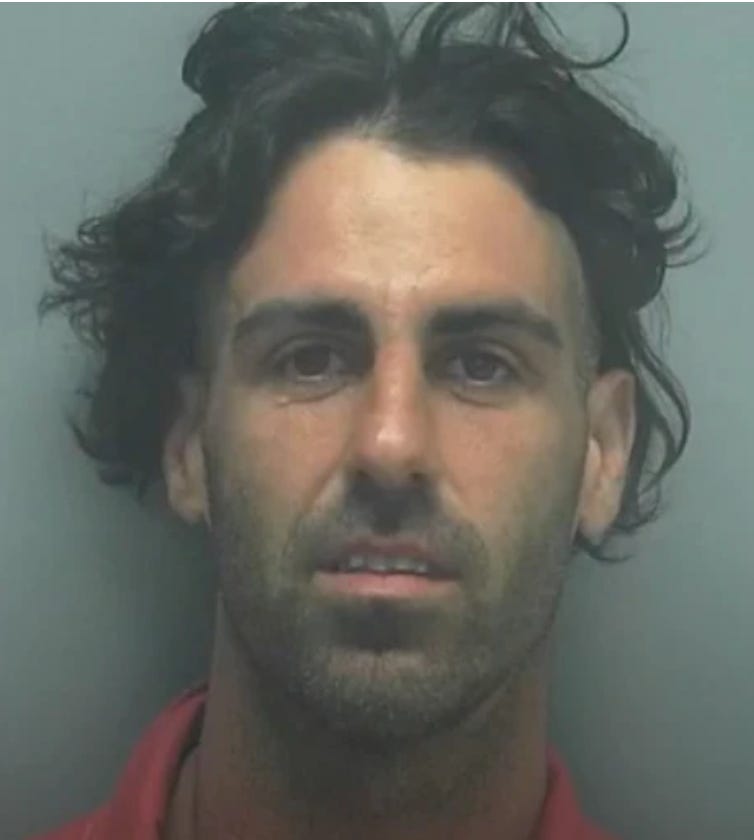As I sat by the microphone, the darkness of the room wrapped around me like a thick curtain, deepening my sense of anticipation. I could feel the weight of the story I was about to tell — one that had occupied my thoughts and tugged at my heart for far too long. The case of Wendy Hudakoc loomed large in my memories, a name that reverberated through the corners of my mind like a haunting refrain. It was more than just a narrative; it embodied the delicate nature of youth and the deep, unspoken sorrow that often lingers in the silence, waiting to be acknowledged.
That fateful night, November 15, 1998, was about 73 degrees with little humidity, an almost perfect fall night for Naples, Florida. The cool air bore witness to the last moments of a bright-eyed 14-year-old girl. How vivid the images are in my mind, of Wendy poised at the brink of adolescence, caught in the intricate web of teenage decisions. The image of her whispering conspiratorial secrets with her sister Sharlene still hangs heavy with unfulfilled dreams.
This case holds a specific significance to me. I knew Wendy. As I sit down to write this, I can almost feel the weight of the memories pressing against my chest, constricting my breath. Wendy Hudakoc was more than just my softball teammate; she was a fragment of my childhood, a blip of innocent laughter in a world too soon marred by harsh realities. I remember her vividly, shoulder-length brown hair bouncing as she dashed across the softball field, her smile lingering like sunlight on a summer day. We were 14, untamed and invincible, or so we thought.
Her disappearance was my first real brush with the darkness that sometimes lurks just beyond the safety of our well-kept neighborhoods. When Wendy vanished, our world tilted off its axis. I felt a collective gasp among our friends as if we were all holding our breath, hoping that someone would exhale the truth and bring her back. Yet, days turned into weeks, then years, with no resolution.
It was baffling and tragic the way Wendy’s absence transformed our lives. The echo of her laughter faded, replaced by whispers of uncertainty and suspicion. I recall overhearing adult conversations, their hushed tones heavy with dread. Each mention of her name ignited a flicker of hope, followed by a dark wave of despair when those hopes were dashed. “Maybe she ran away,” I thought. But deep down, I grappled with the uncomfortable truth — she never returned.
The details of her disappearance remain burned in my mind, puzzling me like a riddle I can’t solve. Wendy had snuck out of her home that evening, that careless bravado we all embodied at that age. A phone call from 21-year-old Ronald DePeppo, a stranger whose insidious shadow loomed over her fate, moved like a specter in my thoughts. The phone rang, and then she was gone out her bedroom window.
As time passed and I became engulfed in my burgeoning interest in true crime, I struggled to reconcile my childhood fantasies with the chilling reality of Wendy’s absence. Her story was more than a headline; it was the shattered remnants of my naive youth. Even my father, who had coached our softball team, would mutter, “I wonder what ever happened to Wendy.” Each time, it felt like a dagger, a reminder that some stories never receive their rightful endings.
I learned of Ronald DePeppo’s questionable past, his linking to underage girls, and the tangled web of his life that made him seem so filled with dark potential. It left me feeling vulnerable. I was young, but I understood enough to know evil people were lurking in the shadows, ready to snatch away the light of someone like Wendy.
DePeppo appeared out of nowhere — he met Wendy at the bowling alley shortly before she vanished, called her that night to invite her to a party, and then lied to the police about his whereabouts. Just when the police started asking questions, his car mysteriously burned to the ground. It’s all too convenient, isn’t it?
Several discrepancies arose in DePeppo’s statements regarding the events surrounding Wendy’s disappearance, warranting a careful analysis of his credibility. DePeppo’s account presented a series of critical details that, when analyzed, raise questions about the veracity of his statements.
Firstly, DePeppo claims that he drove Wendy to a party and dropped her off at her home around 2:45 a.m. His assertion that Wendy mentioned meeting someone named Jeff is particularly notable, given that her friends and family do not know such an individual. This inconsistency undermines DePeppo’s credibility and raises concerns about potential fabrication or miscommunication regarding Wendy’s social interactions.
Additionally, DePeppo asserts that he has an alibi for the time of Wendy’s disappearance, claiming to have spent the night at the residence of 17-year-old Johnny Walker, who was already a sex offender at that point. However, the integrity of this alibi is undermined by the testimony of Ron’s girlfriend, Becky, who indicated that DePeppo requested her to lie on his behalf, asserting that he was with her instead. This revelation not only implicates DePeppo in potential deceit but also raises the pressing question of his motives for presenting a false narrative to authorities.
The inconsistencies in his statements require more investigation. DePeppo’s alibi lacks supporting evidence, and no one who should know about Wendy’s relationships has confirmed his account. This raises doubts about whether his story is trustworthy and suggests it may be self-serving.
The car fire involving DePeppo happened on the same day he was questioned about Wendy’s disappearance. This coincidence raises many questions and offers unclear explanations. DePeppo claims that a lit cigarette, carelessly used by his friend Johnny Walker, started the fire. This explanation may seem believable at first. However, looking closer at the details reveals that the situation is confusing and leaves many questions unanswered.
The sheer randomness of a car igniting in one’s own driveway, particularly on a day weighed down by police inquiries, raises eyebrows. DePeppo’s apparently innocent narrative promptly collapses when one considers the fate of the vehicle — it was found completely burnt out, devoid of any sign of its former life. This immediate transformation from a mundane mode of transportation to a charred shell veers into the theatrical field. Is it not curious that, despite elaborate examinations by forensic experts, investigators could only unveil the most trivial of findings, such as an inconsequential hammer in the trunk accompanied by an unidentifiable piece of fiber or hair? This is hardly the decisive breakthrough one would hope for in an investigation grounded in every parent’s worst nightmare: the unexplained disappearance of a young girl.
The lack of solid evidence, along with the unfortunate limitations of forensic testing, places DePeppo in a position far from innocent, leaving him mired in suspicion. The FBI’s failure to find any incriminating information from the remnants of that vehicle only intensifies the scrutiny surrounding him.
Over two decades later, Wendy’s disappearance casts a long shadow over the lives of those who knew her — a somber reminder that fate has a penchant for requiring a heavy toll on unresolved mysteries. It haunts even those who, like my father, were merely spectators in a narrative they can never fully comprehend. His occasional musing — “I wonder what ever happened to Wendy” — reinforces the very essence of a tragedy that refuses to be forgotten, revealing how life is unyieldingly riddled with gaps of unknowing.
Having had a fleeting connection with Wendy — a shared age, parallel paths on a softball field — allows me to scrutinize the enigma from a more personal angle. While it’s easy to fantasize about theories or culprits, the sad truth remains: Wendy has never been found, and those responsible remain unaccountable. Cynicism persists as a defensive mechanism, a necessary skill in a world that trades in secrets and silence. We live with unanswered questions as our companions, a constant reminder that justice is a fickle friend, often eluding those who seek it most ardently.
Last I heard, Ronald DePeppo was homeless, living out in Las Vegas, and his mental health had severely declined. Johnny Walker, though, had a criminal record at the time of Wendy’s disappearance. In December of 1997, Walker was arrested on two counts of lewd, lascivious, or indecent assault or act upon or in the presence of a child. He pled no contest, was adjudicated guilty, and was sentenced to 1 year in jail and 5 years of sex offender probation. In August of 1999, he was again arrested for lewd, lascivious, or indecent assault or act upon or in the presence of a child, along with violation of probation. This time, he was sentenced to 15 years in state prison and classified as a sexual predator. He was released from prison on October 1, 2014, and still resides in the area.
When we embarked on the podcast journey, we intended to illuminate underrepresented stories — Wendy’s case being a prime specimen. Yet, even amid our educated enthusiasm, it became painfully clear that our first attempt was tragically superficial. Perhaps we were naïve to believe enthusiasm alone could carry the depth required for such a heartbreaking tale.
The initial recording felt awkwardly performed. The weight of Wendy’s experience lingered in the air, begging for authenticity, but we failed to deliver. So, in a moment that could be described as either an epiphany or sheer desperation, we decided to scrap the first take entirely. We decided to re-record that episode dedicated to her, the feeling gnawed at me — this wasn’t just a narrative; it was a girl who deserved more than our fading memories.
In this rewrite, we went deeper — crafted our words with a ferocity that screamed, “This matters!” But I can’t help but question whether any amount of re-tweaking could truly capture the gravity of her situation. Does passion alone suffice in the face of such complexity, or is it just a veil over our inadequacies? It’s easy to get caught up in the theatrics of retelling a story, believing that the right tone will somehow impress the weight of emotion — regardless of our prior failings.
Wendy is eternally caught in a moment of untainted innocence, a snapshot of a time when dreams flourished and the future seemed filled with endless possibilities. While we once envisioned vibrant lives ahead of us, unblemished by hardship or sorrow, she stands as a bittersweet reminder that life can veer into unexpected harshness. The loss I feel is not merely that of a teammate; it’s the shattering of a cherished part of my childhood — a delicate shard of security and joy that I can never hope to reclaim.
I can only hope that one day, someone will have the courage to uncover the truth that lies buried in the heavy silence of those surrounding her mysterious disappearance. Until that day comes, I carry the memory of Wendy with me, forever frozen in time. She was a radiant soul, vibrant and full of life, deserving of far more than the dark shadows that now shroud her existence and hold her captive. Each moment spent in her presence lingers in my heart, a beautiful reminder of what was and what is tragically lost.
If you have any information about Wendy Hudakoc, please reach out anonymously to 1–800-THE-LOST or the Collier Sheriff’s Office at (239) 774–4434. Perhaps in this effort, we can finally shed light on her story, breaking the silence that has echoed for far too long.







